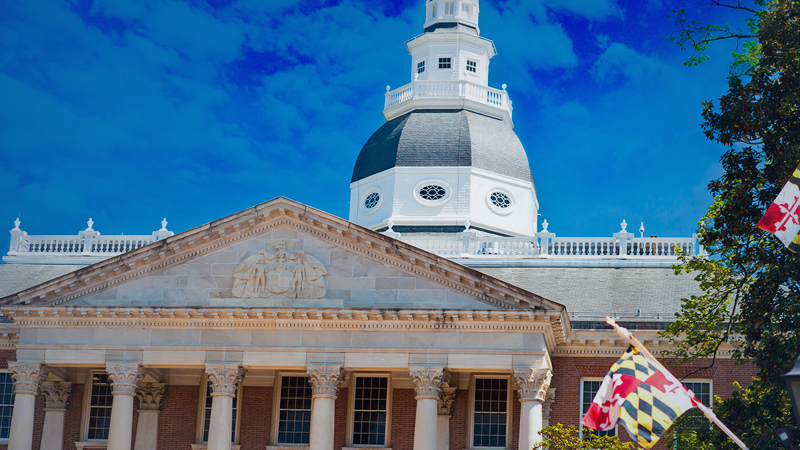Maryland legislature advancing $700 million package of taxes to pay for schools

Democrats who control the Maryland General Assembly are advancing a roughly $700 million tax package, a multipart plan that includes an array of new taxes on dog grooming, certain corporations, vaping products and streaming services such as Netflix.
The package is on track for approval in the House of Delegates by the end of the week, and leading Democrats have pitched it as a way to pay for a sweeping public education overhaul that is also expected to be passed in the coming days.
These tax proposals have drawn far less public notice - or outrage - than a now-scuttled, $2.9 billion plan to expand the state's sales tax to include services. Gov. Larry Hogan, a Republican, rallied opposition to the plan to tax services, but the governor has not similarly lobbied against this package.
Proponents say the measures target primarily wealthy residents and multistate corporations.
"It will not hit the pocketbooks of the vast majority of Marylanders, and the kids will get better schools," House Majority Leader Eric Luedtke, D-Montgomery, said.
Portions of the package are aimed at modernizing the state's tax code to reflect the digital economy, thereby correcting certain disparities. For instance, a book purchased from a bookstore is subject to state sales tax but a downloaded e-book is not.
The most far-reaching proposal would change that, and apply Maryland's sales tax to digital goods, including streaming services such as Hulu, mobile phone apps, movie purchases, software downloads and digital video games. It would raise approximately $150 million a year, according to legislative analysts, and the Maryland would join 28 other states in taxing digital downloads.
A new tax on "luxury services" would make things such as pool cleanings, fur coat storage, pet grooming and country club memberships subject to the state's 6 percent sales tax. That would generate an estimated $35 million a year.
House Minority Whip Kathy Szeliga, R-Baltimore County, called the overall package "pretty terrible" and particularly criticized the idea that the taxes targeted only Maryland's upper crust.
"You can't say watching TV is a luxury," she said. "The 'luxury' of having someone groom your dog? I mean, really."
Services as diverse as fortune telling and hair removal are included in the proposal. "Girls, your waxing is going to be taxed," Szeliga said.
She said that Republicans, vastly outnumbered by Democrats who hold veto-proof majorities in both chambers, will try to curtail the tax proposals when they're fully debated on the House floor this week.
The Maryland Senate is similarly working on a package of bills that also would include a novel tax on the targeted digital ads that chase consumers around the Internet. Those proposals are still in the committee process, but leaders in both chambers said they expect the bills to be passed in some form by the end of the month.
Last week, the House approved a top-to-bottom overhaul of public schools, believed to be the largest restructuring of public education since Massachusetts revamped its schools three decades ago.
The changes would provide free public preschool statewide, tougher teacher standards and higher pay for educators, more resources for districts with high concentrations of poverty, and a host of other policy prescriptions that proponents say could make Maryland's schools the envy of the world. The changes are also expected to cost $4 billion a year when fully implemented a decade from now, a price tag that has prompted Hogan to criticize the plan as "pie-in-the-sky" and too costly. The governor has derided lawmakers' advancing of the policy changes without a clear means to pay for them.
Hogan's spokesman, Michael Ricci, did not immediately respond to a request for comment Tuesday on the latest revenue package. But in the past, Ricci has criticized the proposals as "years late and still billions short" of paying for the education overhaul.
The other, less controversial elements of the new tax plan include doubling the excise tax on cigarettes to $4 per pack and applying the excise tax to vaping products and e-cigarettes, which are now excluded from the excise tax.
Another hefty proposal closes what proponents call corporate tax loopholes that let multistate corporations shift their tax burden outside of Maryland. The annual Maryland tax liability of those multistate corporations would rise by roughly $150 million.
One element of the tax package would institute "combined reporting," which forces corporations to pay state taxes on economic activity within Maryland's borders and not just shift their entire tax burden to states where they are headquartered. More than half the states in the country use combined reporting for multistate corporations.
Another element would levy sales tax for goods sold by Maryland companies in states that do not have sales taxes. Such a "throwback" provision is used in some form by 28 states and the District of Columbia, according to legislative analysts.
